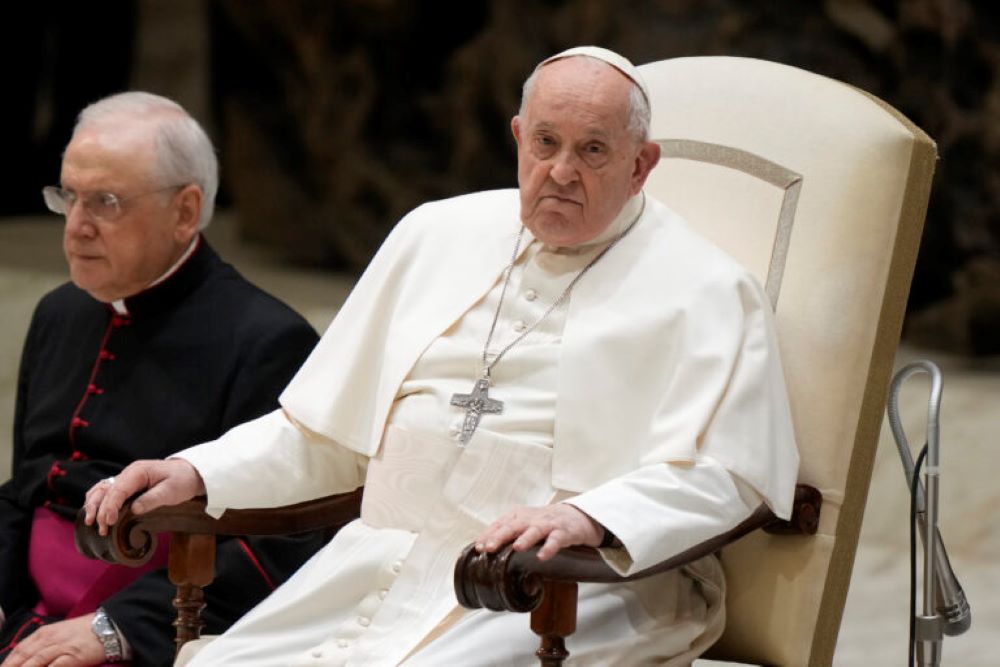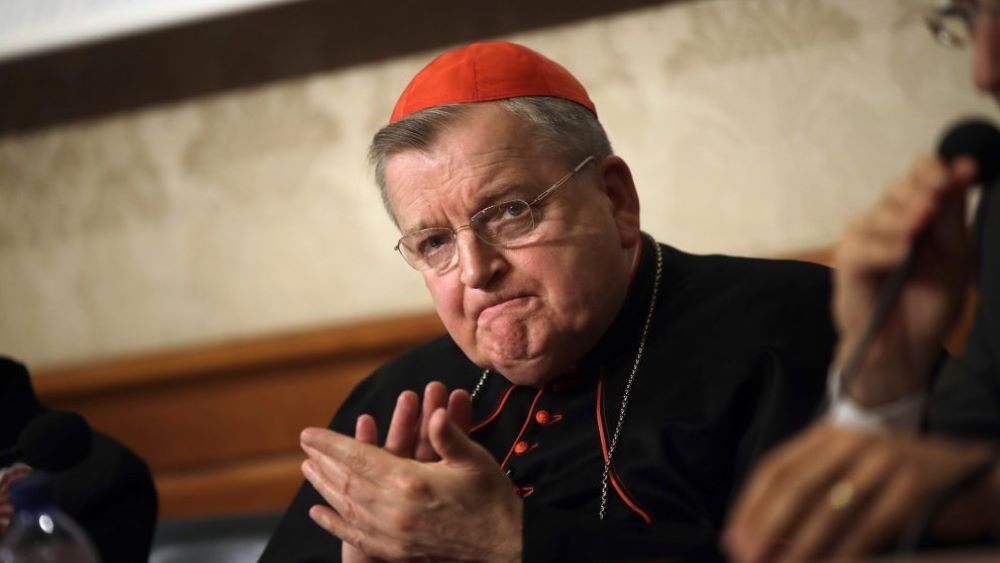
Pope Francis attends his weekly general audience in the Paul VI Hall, at the Vatican on Feb. 28. (AP/Andrew Medichini)
Autocratic, vindictive, careless, intolerant and ambiguous are just some of the slurs directed at Pope Francis by Demos II, an anonymous cardinal who published a letter in late February laying out a strategy to make sure that Francis’ influence ends with his papacy.
He — or they; rumor has it there were multiple authors — calls himself Demos II after another anonymous Demos, later identified as Cardinal George Pell, who two years ago issued a document criticizing Francis' pontificate. Pell could not be Demos II since he died last year. Pell's document was titled "The Vatican Today"; the new document is "The Vatican Tomorrow."
Such public attacks by cardinals who have sworn loyalty to the pope have been unheard of in modern times. No liberal cardinal issued such a document during the papacies of John Paul II or Benedict XVI.
Centuries ago, such an attack would be grounds for a cardinal's execution for violating his oath and being a traitor. Today, the cardinal should lose his place in the College of Cardinals and his right to participate in a conclave, but he probably won't.
I have no problem with disagreeing with the pope — I have done it myself — but it should be done openly and respectfully.
Demos II is a fraud who mourns a church of the past and his own loss of power in it.
It is noteworthy that this cardinal and his friends had no problem with the autocratic and intolerant actions of John Paul and Benedict. These popes routinely silenced bishops and theologians who disagreed with them. Seminary professors were fired; theologians were forbidden to publish. No such actions have been taken by Francis.
The anonymous cardinal wants to return to the days of suppressing theological discussion in the church, to rid it of "ambiguity." He is outraged that the pope encourages theological discussion and debate, and wants to return to a pre-Vatican II church where nothing changes. He seems to happily side with those prelates at the council who opposed any changes in church teaching or practice.
The pope, on the other hand, knows that discussion and debate is the way theology develops, which is essential if the church is going to communicate with people in the 21st century.
Those who believe that the pope is fostering ambiguity in the church cannot distinguish between the faith and how we explain the faith. They have no sense of history or the development of dogma. They appeal to Augustine or Thomas Aquinas but have no true understanding of them.
The genius of both these figures was that they took the avant-garde thinking of their times and used it to explain the faith: Augustine used Neoplatonism, and Aquinas used Aristotelianism.
If the church is to be true to its tradition, we should imitate Augustine and Aquinas, not simply quote them. Theologians should be free to experiment with new ways of explaining the faith, using modern philosophy, literature and science.

Cardinal Raymond Burke applauds during a news conference at the Italian Senate on Sept. 6, 2018. (AP/Alessandra Tarantino)
Jesuit priest and paleontologist Pierre Teilhard de Chardin used evolution to explain the role of Christ in the cosmos in a way that spoke to contemporary Christians. He, like Aquinas before him, was condemned by church authorities before he was accepted by them.
The cardinal and his friends instead only want to use the church's ancient texts as a treasure chest of quotes with which to hammer their opponents.
The anonymous cardinal also attacks Francis for not governing the church collegially with his brother bishops, but his real complaint is that the pope is not doing what the cardinal wants him to do.
Pope Francis has been more collegial than any other pope in history, as can be seen in the way recent synods of bishops have been run. At Francis' first synod, he encouraged bishops to speak boldly without concern for what he or others thought. He even told them to imitate St. Paul, who criticized St. Peter, the first pope, at the Council of Jerusalem (Acts 15).
Francis did this because he knew many bishops were frustrated by the synods held under John Paul and Benedict, where participants were told what topics could not be discussed. Vatican officials' complete control of these synods gave them the feel of Soviet assemblies where the only purpose of the meeting was to praise the great leader. Most of the speeches quoted the pope to himself, as if he did not know what he had said.
The synods of Francis have been the freest ever.
In one area, the Demos II is correct. Francis has not consulted the College of Cardinals as much as did John Paul, who revived consistories as a place for discussing issues facing the church. Francis discontinued this practice, although he did create a council of nine cardinals with whom he consults periodically.
Some thought John Paul's innovation was inconsistent with the synodal system, which has elected as well as appointed members. Others thought it would lead to a consultative system with two houses, the synod and the consistory, which would be like the House and Senate in the United States, or the British House of Commons and House of Lords.
But Demos II's objection is more straightforward. The discontinuation of the consistories has reduced the influence of the cardinals. Being a cardinal, he does not like that.
One advantage of the consistories was that cardinals got to know each other prior to a conclave.
Advertisement
As an example of Francis' intolerance and vindictiveness, conservative commentators point to the removal of the American conservative Cardinal Raymond Burke as head of the Apostolic Signatura, the church’s highest judicial authority. They conveniently forget how Archbishop Michael Fitzgerald, head of the Vatican office for interreligious dialogue, was exiled to Egypt by Benedict.
Let's all agree that popes have the right to appoint and remove Vatican officials.
In truth, Demos II is a fraud who mourns a church of the past and his own loss of power in it.
He has no consistent ecclesiology. He asserts that the church is not a democracy, but publicly releases his diatribe in the hopes of swaying public opinion to pressure the cardinals at the next conclave.
Make no mistake about it, this document is about power and influence in the church. Demos II has been sidelined, and he is angry.








